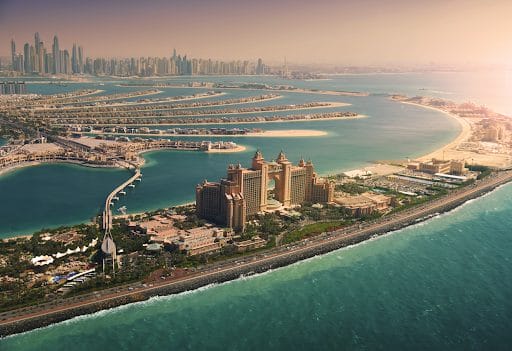What opportunities does Dubai real estate offer to crypto investors?
Against the backdrop of slowing global economic growth and general political instability, buying real estate in Dubai remains one of the most profitable ways to save and multiply funds. This also applies to investments in cryptocurrency. The growth of its popularity in the emirate is facilitated by the government’s policy, which has made Dubai an attractive destination for crypto investors from all over the world.

Cryptocurrency and Dubai real estate
Cryptocurrency has been gaining popularity in the Dubai real estate market in recent years. Some major real estate developers have been accepting payments in this format for several years now. For example, Nakheel Properties has been allowing property payments in Bitcoin and Ethereum since 2022 thanks to a partnership with the Hayvn platform. The artificial islands Palm Jebel Ali, Dubai Islands, Palm Jumeirah are among the most famous projects of the developer.
Another major real estate developer, Damac Properties, also accepts payments in Bitcoin and Ethereum. In 2023 alone, the company launched more than 20 new projects. Recent ones include Elo 2 Towers, the Altitude de Grisogono skyscraper, and Utopia, a neighbourhood with expensive villas.
Ellington Properties accepts payments in Bitcoin through the Bitcoin Suisse platform. The developer specialises in luxury properties with unique design and premium amenities. New projects include Art Bay, One River Point, UH, and Mercer House.
The developer MAG entered into an agreement with CoinMENA in late 2022 to accept payments in stablecoins, including USDT and USDC, via the company. The company is building The Ritz-Carlton Residences, an ultra-luxe complex with apartments and villas, Keturah Reserve, a unique eco-friendly community, as well as high-rise and mid-rise buildings with affordable apartments.
Nikolay Kuznetsov, Head of Investor Relations at Empire Heights, revealed how many real estate developers and agencies in the emirate are now working with cryptocurrency:
“We estimate that less than 10% of Dubai’s real estate developers and agencies are now actively using cryptocurrency in transactions. In the next 2–3 years, we are expecting growth to almost 30%, meaning a third of the market will be working with cryptocurrency. This is inevitable given the growing popularity of digital currencies and government support. Cryptocurrencies are a very convenient tool. Now it is important for the state to learn how to regulate these processes to make them as safe as possible,” said Nikolay Kuznetsov.
There are other options in addition to direct payments in cryptocurrency in Dubai. If you use the services of intermediary companies, it is possible to buy real estate from those developers who do not work with digital currencies. The intermediary will transfer funds to the developer and take a certain commission for the services. The developer will receive the required amount in the traditional format.
In the case of buying real estate on the secondary market, the possibility of using cryptocurrency depends on the owner. If the property owner is ready to accept such a payment, no difficulties will arise. Among other things, intermediary companies can help one of the participants in the transaction to create a cryptocurrency wallet, if they have never used digital money before.
“Now a bill is preparing in Dubai, according to which real estate agencies will be able to open escrow accounts for transactions in the secondary market. After signing all the papers, the agency will get its commission and the seller will get the money. This will further reduce risks. If agencies are allowed to use exchange companies for such transactions, they will be able to receive cryptocurrency payments immediately in UAE dirhams. Thus, there will be no risks for anyone,” noted Nikolay Kuznetsov.
Government support and infrastructure conditions
Dubai Blockchain Strategy
Back in 2016, the government decided to develop blockchain in Dubai. The initiator was Sheikh Mohammed bin Rashid Al Maktoum, Vice President of the UAE and Ruler of the Emirate. For this purpose, the Dubai Blockchain Strategy was adopted, according to which 50% of all government money transactions were planned to be transferred to a blockchain platform created with the support of IBM.
Real Estate Blockchain Initiative
In 2017, the Dubai Land Department (DLD) launched the Dubai Real Estate Blockchain Initiative, a blockchain platform that enables the conversion of real estate rights into digital tokens. These tokens allow for equity ownership, allowing investors to buy or sell shares of a property.
The procedure includes the following stages:
- Identification of the asset.
- Due diligence – a check to confirm that the asset is suitable for tokenization.
- Documenting the rights and obligations of token holders.
- Generation of tokens that will represent shares in real estate.
- Realisation of tokens among investors.
According to analysts, such an approach provides a number of advantages:
- lowers the market entry threshold;
- increases the transparency of transactions;
- allows investors to diversify portfolios by investing small sums in shares in different real estate objects;
- speeds up operational processes and reduces costs.
The security of this approach is ensured by the blockchain technology itself, according to which each transfer is independently recorded on multiple computers, making it impossible for a single person to change anything in the records that have already been made. This requires confirmation from all sources where the data was entered.
As a result, DLD not only opened additional opportunities for investors, but also set a new global standard, allowing making investments in real estate more affordable, safer and more efficient. Experts note that as blockchain technology improves, the legal and regulatory framework for its application will evolve.
Virtual Asset Regulation Law
In March 2022, the Emirate’s authorities adopted the Dubai Virtual Asset Regulation Law to protect the interests of investors. To control it, a special department was created. Virtual Assets Regulatory Authority (VARA) should monitor cryptocurrency transactions and keep users’ personal data safe. In turn, local banks underwent digital transformation to effectively handle cryptocurrency payments.
As a result, the Dubai government has succeeded in creating an attractive environment where blockchain development is welcomed rather than facing multiple obstacles from government regulators.
“The Dubai government is committed to innovation, wants the emirate to become a global technology leader, and is actively promoting blockchain technology. Dubai even has one of the world’s first blockchain academies, where these technologies are studied in detail and ways to utilise them are developed. Therefore, within 5 years, the use of blockchain is expected to increase significantly in various industries, including not only finance but also public administration. In addition, it is a matter of economic benefit: attracting investment and improving the business environment,” – said Nikolay Kuznetsov.
He added that the blockchain development strategy is long-term, so we can expect that the government will not change its loyal attitude to this technology in the future.
First results
According to Chainalysis, crypto investors in the UAE generated $204 million in returns from their investments in 2023. The most popular cryptocurrency was Bitcoin. Analysts at Statista predict that the total income from crypto investments in the UAE for 2024 will be $292.1 million.
The UAE-based blockchain ecosystem Crypto Oasis showed a 13.3% growth in Q1 2024. It currently has more than 2,040 businesses. Companies related to the real estate market occupy 9.5% of the ecosystem’s corporate sector, or 0.5% of its total structure.
The ecosystem itself is concentrated in the Middle East. All organisations in it are divided into 2 groups:
- 71% – those for whom blockchain technology is core to their operations;
- 29% – those that are indirectly connected with blockchain.
Market experts note that now in Dubai there are real estate developers’ projects worth billions of dirhams, where part of the funds is placed on blockchain platforms. At the same time, the ongoing tokenization of the real estate market in the emirate will create a more efficient and secure environment for transferring funds.
Trends and prospects
Regarding the future of crypto-payments in the real estate market, experts give a rather optimistic forecast, noting several key trends:
- Development of blockchain technology. As the technology evolves, it will become increasingly simple and efficient, which will simplify cryptocurrency transfers and increase their accessibility.
- Improved regulatory measures. They should bring clarity to the use of cryptocurrency in the market and attract conservative players.
- Increased transparency. Well-established legal mechanisms will help combat money laundering and identify counterparties, reducing the risks associated with this trend.
- Changing priorities. Cryptocurrency is becoming increasingly popular, especially among young buyers, which could make it a key investment tool in the UAE real estate market.
- Adopting innovation. More real estate developers and agencies will start accepting cryptocurrency payments to retain tech-savvy customers.
Participants of crypto projects note the attractiveness of Dubai against the backdrop of stricter regulations in countries that used to be the main centres of attraction for them. For example, Kadan Stadlemann (Komodo CTO), CTO of blockchain platform Komodo, said in an interview with Cryptonews that the UAE is a friendlier environment for crypto investors than the United States.

According to him, many blockchain projects have relocated to the Emirates because its leadership is “tired of confronting” U.S. regulators. He also said he moved to the UAE from the Netherlands, where there is a growing distrust of cryptocurrency by government agencies. This has forced Komodo and other companies to head to the UAE in search of a friendlier environment.
“The main advantage of Dubai for crypto investors today is a loyal legal environment. In the emirate, cryptocurrencies are supported by the government, and there is an innovative infrastructure. In addition, Dubai is distinguished by its great economic attractiveness, high rates of economic growth, and significant potential for return on investment. Compared to other major cities, such as New York, London, Singapore, Dubai has more flexible and loyal conditions for crypto investors. In Europe and the United States, as well as many Asian countries, the state control and reporting system is stricter than here. In Dubai, however, no one is trying to subject cryptocurrency companies to excessive pressure. On the contrary, they create conditions for them to grow and develop together with the emirate,” said Nikolay Kuznetsov.
Highlights
Blockchain technology is being actively introduced into Dubai’s economy. One of the main proponents of this process is Sheikh Mohammed bin Rashid Al Maktoum, Vice President of the UAE and Ruler of the Emirate. The city authorities have adopted the Dubai Blockchain Strategy and established the Virtual Assets Regulatory Authority to control cryptocurrency transactions.
Representatives of cryptocurrency companies note that the UAE has become an attractive destination for them due to the loyal attitude of the authorities to technical innovations in the economy.
More and more real estate developers allow buying property for sale in Dubai with the help of cryptocurrency. Bitcoin and Ethereum are the most popular. If the developer does not accept crypto payments, you can turn to an intermediary company that will convert them into fiduciary (standard) money for a small commission.
Disclaimer: The text above is an advertorial article that is not part of Cryptonews.com editorial content.






